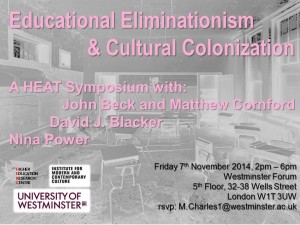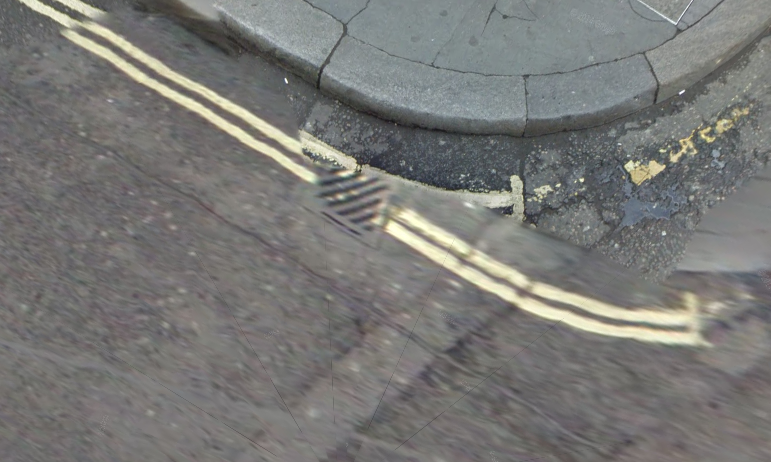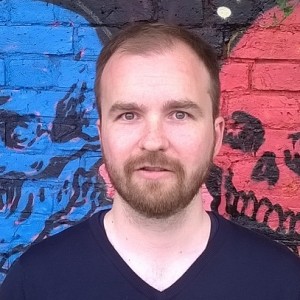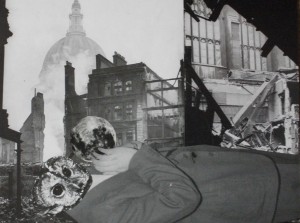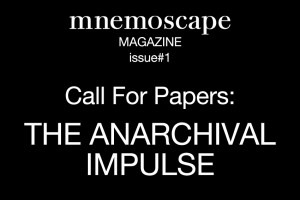Mnemoscape 1: The Anarchival Impulse

A quick plug for the first issue of Mnemoscape Magazine, “The Anarchival Impulse”, and for their brand new website: www.mnemoscape.org
Mnemoscape Magazine is a biannual online magazine dedicated to furthering research into contemporary visual culture and art practices that operate at the interstices of political and historical scrutiny, with a special focus on issues of memory, methodology and the archival impulse.
0.The Anarchival Impulse / editorial by Mnemoscape
1.the Archive of Destruction: Pedro Lagoa interviewed by Elisa Adami
2.Anarchaeology Series. A Project by Az.Namusn.Art / article by Alessandra Ferrini
3.Watered down modernity. Iconoclastic fluids in Alexander Apóstol’s archival mediations / Alexander Apóstol in conversation with Lisa Blackmore
4.Against Historiographical Positivism: Some Skeptical Reflections about the Archival Fetishism / article by Giulia Bassi
5. Art Criticism 2.0 / article by Paolo Chiasera
6.Showcase: Alessandro Di Pietro, dOCUMENTA (13) Das Begleitbuch / The Guidebook KATALOG / CATALOG 4/3
7.Between the Archive and the Unarchivable / article by Wolfgang Ernst
8.Simon Starling’s Show ‘Analogue Analogies’ at Staatsgalerie Stuttgart / exhibition review by Yvonne Bialek
9.(An)Archival Experiment through the ICA / article by Lucy Bayley, Ben Cranfield and Anne Massey
10.The Pathological Rhythm of the Archive / article by Eirini Grigoriadou
11.Multiple Signatures of Subtraction / article by Robert Luzar
12.Showcase: Emilio Vavarella, The Sicilian Family
13.Returning to the Tabularium / curatorial essay by Alana Kushnir (with showcase by Lawrence Lek, Memory Palace)
14.Retrograde Stairwell / short story by Chris Mason
Fridtjof Nansen’s Farthest North and the Arctic route to Romantic Nationalism seminar, Oct 29th

Wednesday 29 October, 4.15pm
Room 311, University of Westminster, Wells Street, London W1T 3UW
Professor Cian Duffy, St Mary’s University
“‘[T]hat voyage will not cease to stir the imagination’: Fridtjof Nansen’s Farthest North, the Sublime, and the Arctic route to Romantic Nationalism”
This talk will examine the various ways in which Fridtjof Nansen’s celebrated account of his attempt to reach the North Pole in 1893-96 draws upon a Romantic aesthetics of natural sublime in order to formulate arguments about the relationship between social and natural histories. The paper considers Nansen’s contribution to the developing relationship between science writing and literature, the importance of a Romantic construction of the natural sublime to Norwegian nationalism at the end of the nineteenth century, and Nansen’s debts to British as well as Norwegian Romantic writers.
Educational Eliminationism & Cultural Colonization, Nov 7th

Educational Eliminationism & Cultural Colonization
Friday 7th November, 2pm – 6pm (followed by drinks reception)
Westminster Forum, 5th Floor, University of Westminster, 32-38 Wells Street, London W1T
A HEAT (Higher Education & Theory) Symposium, co-hosted by Institute for Modern & Contemporary Culture (IMCC) and the Higher Education Research Centre (HERC) at the University of Westminster.
David J. Blacker, author of The Falling Rate of Learning and the Neoliberal Endgame, defines educational eliminationism as a state of affairs in which elites no longer find it necessary to utilize mass schooling as a first link in the long chain of the process of the extraction of workers’ surplus labour value but instead cut their losses and abandon public schooling altogether. In The Art School and the Culture Shed, John Beck and Matthew Cornford have charted the decline of local art schools and concordant rise of the ‘destination’ art gallery, and asked what this tells us about the changing relationship between the function of education and art in the new creative economy. Nina Power (One-Dimensional Woman) argues that current attacks on the education system are part and parcel of a broader war on cognitive and immaterial labour, upon which the art world provides a peculiarly privileged vantage point.
Drawing on the etymological and political association between culture and colonization, this symposium seeks to investigate the currently shifting relationship between education and culture through the themes of eliminationism and colonization.
rsvp to the organizer: M.Charles1@westminster.ac.uk
Tommi Kakko on Dr. Hibbert’s Theory of Apparitions and Hallucinations
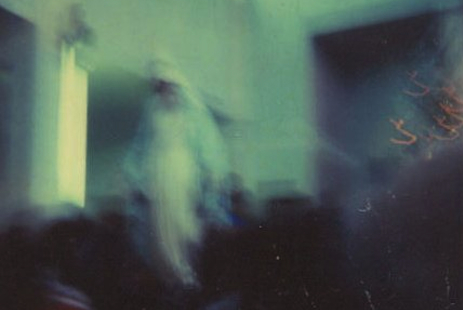
Wednesday 15 October, 4.15pm
Room 311, University of Westminster, Wells Street, London W1T 3UW
Dr Tommi Kakko, University of Tampere / Visiting Research Fellow, IMCC
“Dr. Hibbert’s Theory of Apparitions and Hallucinations”
Samuel Hibbert’s (1782–1848) Sketches of the Philosophy of Apparitions (1824) is a famous early attempt to understand the phenomenon of hallucinations from a scientific perspective. He and his colleague John Ferriar (1761–1815) wrote studies to counter ghost stories, superstitions and esoteric beliefs. The doctors believed these had filled nature with absurd and terrifying imaginary creatures. Ferriar wanted to ease the fears of his contemporaries and erase the stigma of madness from hallucinations. Hibbert’s book was much more ambitious. He created a theoretical framework based on associationism and wrote a great deal about the history of hallucinations in alchemy and other occult arts. He also sketched out theories of the conscious and unconscious mind. Hibbert’s theories are particularly interesting when one focuses on the problem of second hand information in his analyses. The theories rely heavily on stories about apparitions, but actually do very little to examine their nature. Literary critics like John Dryden and Meric Casaubon did, but their works are notably absent from Hibbert’s book.
All welcome!
Contemporary China Centre Seminars

Contemporary China Centre University of Westminster
2014 Autumn Semester Seminars
All seminars take place in The Westminster Forum, Fifth Floor, University of Westminster, Wells Street, London W1T
Dr Joanne Smith Finley
‘Controlling Terra Nullius: Truth and Consequences of the ‘National Partner Assistance Programme’ in Xinjiang, China.’
Wednesday 29 October, 5-7pm
Joanne Smith Finley is Senior Lecturer in Chinese Studies in the School of Modern Languages at Newcastle University. Her monograph The Art of Symbolic Resistance: Uyghur Identities and Uyghur-Han Relations in Contemporary Xinjiang (Brill) was published in 2013. She is also co-editor of Situating the Uyghurs between China and Central Asia (Ashgate, 2007).
Dr Heather Inwood
‘Contemporary Chinese Literature as Participatory Culture: Viral Verse and Transmedia Worlds’
Wednesday 12 November, 6-8pm
This talk explores the digital transformation of literary practices underway in China by focusing on case studies from contemporary Chinese poetry and popular fiction. Since the 1990s, the rapid growth of the Chinese internet has helped make literature the tenth most popular online activity, ushering in an age of mass participation in the creation and evaluation of literature. This talk considers the implications of participatory literary production for the definition and status of Chinese literature.
Heather Inwood is Lecturer in Chinese Cultural Studies and Undergraduate Programme Director for Chinese Studies at the University of Manchester. Her book, Verse Going Viral: China’s New Media Scenes, explores the fate of modern Chinese poetry an age of the internet and consumer culture and was published by the University of Washington Press in 2014.
Guo Xiaolu, in discussion with Professor Chris Berry
‘Beyond Identities – Artists as Avatars of Narrative Force’
Wednesday 26 November, 5-7pm
Xiaolu Guo is a British/Chinese novelist, essayist, filmmaker and poet. As one of Granta’s Best of Young British Novelists, Xiaolu has published several novels and short story collections by Random House UK/USA. She has also directed a number of feature films and documentary essays. Her first feature, How Is Your Fish Today, a hybrid of documentary and fiction, was selected at the 2005 Sundance Film Festival and received Grand Jury Prize at the International Women’s Film Festival in Pairs. Her second feature She, A Chinese, a homage to Godard’s La Chinoise, received the Golden Leopard Award at Locarno Film Festival. Late At Night: Voices of Ordinary Madness is her most recent essay film, selected for the London Film Festival and the National Gallery of Art in Washington DC in 2014.
Please note that non-University of Westminster attendees for any of the following seminars should register with Helena Scott at h.scott@westminster.ac.uk
Frankfurt Book Fair
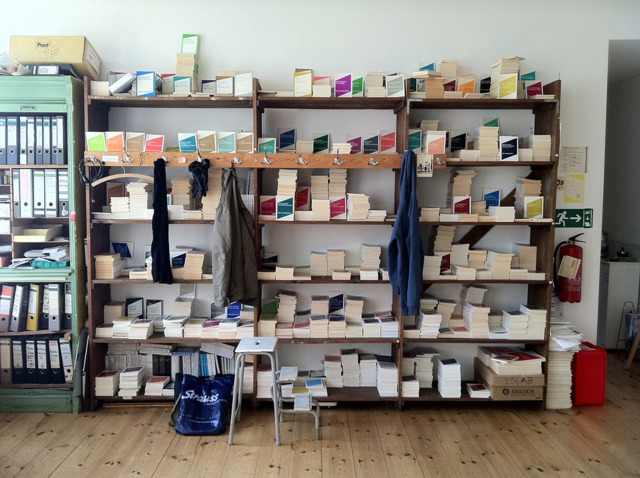
IMCC’s Data Futures project launches its Merve Electronic Back-Catalogue at the Frankfurt Book Fair.
In collaboration with Berlin publisher Merve Verlag and Hybrid Publishing Consortium, IMCC has re-delivered more than a hundred previously out of print books in three independent electronic formats – book-in-browser, ePub2 and PDF – plus print-on-demand. Initially a research project accessible at http://merve.consortium.io using a workflow developed by Data Futures using its freizo software platform, the project is now focusing on reader customization of the texts and internet delivery models.
Data Futures has imported the original books as Optical Character Recognition (OCR) files and created a workflow for contributors in several countries to address OCR errors and to markup structure, such as chapter headings, illustrations, footnotes and citations. freizo then exports html5 which can be processed and re-paginated into multiple formats.
Review of Jameson’s Antinomies of Realism

David Cunningham’s review of Fredric Jameson’s recent The Antinomies of Realism in the latest issue of Radical Philosophy is currently up as a freebie on the RP website.
You can download it here: http://www.radicalphilosophy.com/article/the-contingency-of-cheese
Educational Eliminationism and Cultural Colonization seminar, Nov 7th
Educational Eliminationism and Cultural Colonization
Friday 7th November, 2-6pm
Westminster Forum, University of Westminster, Wells St., London W1T 3UW
Fitzrovia Reading CANCELLED
CANCELLED DUE TO ILLNESS. WE HOPE TO RESCHEDULE THIS EVENT SOON.
Fitzrovia Atlas and Stepaway Magazine present an evening of new writing by Joan Byrne, Tony Rickaby, and Kate Wise.
Thursday 9 October 2014, 6-30pm
Fyvie Hall, University of Westminster, 309 Regent Street, London W1B 2HW
Admission FREE. All Welcome.
FITZROVIA ATLAS is a project based in the Department of English, Linguistics and Cultural Studies at the University of Westminster dedicated to exploring the literary and cultural life of Fitzrovia.
STEPAWAY MAGAZINE is an established online literary magazine that publishes the best urban flash fiction and poetry by writers from across the globe. http://stepawaymagazine.com
Bond Girls seminar

Wednesday 1 October, 4.15pm
Room 311, University of Westminster, 32-38 Wells Street, London W1T
Dr Monica Germana, University of Westminster
“Poisoned Stilettos, Diving Knives, and Lipstick Guns: Phallic Fashion and Bond ‘Girls’”
English Literature and Culture research seminars 2014
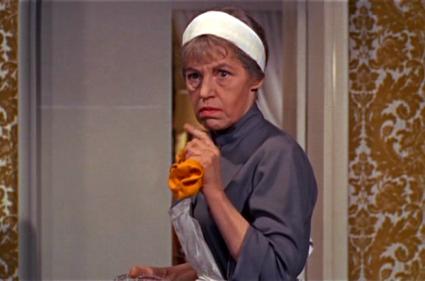
A new academic year and a new series of fortnightly English Literature and Culture research seminars, kicking off with our own Monica Germana.
All seminars will be held in room 311 in the University of Westminster’s Wells Street building at 4.15pm, followed by the obligatory retirement to The Green Man. All welcome.
Wednesday 1 October
Dr Monica Germana, University of Westminster
“Poisoned Stilettos, Diving Knives, and Lipstick Guns: Phallic Fashion and Bond ‘Girls’”
Wednesday 15 October
Dr Tommi Kakko, University of Tampere; Visiting Research Fellow, IMCC
“Dr Hibbert’s Theory of Apparitions and Hallucinations”
Wednesday 29 October
Professor Cian Duffy, St Mary’s University
“‘[T]hat voyage will not cease to stir the imagination’: Fridtjof Nansen’s Farthest North, the sublime, and the Arctic route to Romantic Nationalism”
Wednesday 12 November
Dr Andy McStay, Bangor University
“Exploring the Pharmacology of Empathic Media: Health, Wearables and Analytics”
Wednesday 26 November
Dr Daniela Caselli, University of Manchester
“Modernist Children”
Wednesday 10 December
Dr Gwilym Jones and Nigel Mapp, University of Westminster
Discussion on Shakespeare
Welcome to Tommi Kakko, Visiting Research Fellow
The IMCC is delighted to welcome Tommi Kakko as our visiting research fellow during 2014-15. Tommi is based at the University of Tampere, Finland, and has published in journals and essay collections on a variety of topics including John Dryden, Daniel Defoe, intermediality, modernism and psychedelia. While based at the Institute, he is writing a book about hallucinations in early modern medical texts, occult writings and literary criticism. The aim of the project is to examine how theories concerning naturally occurring hallucinatory experiences, visions and apparitions were first developed and how they evolved before the birth of modern psychology.
The Multi-Modal Museum seminar, July 9th 2014

Wednesday 9 July 2014, 6.30pm – 9pm
The Boardroom, University of Westminster , 309 Regent Street, London W1B 2UW
Annual Museum Studies 2014 Public Forum
The multi-modal museum: new initiatives on access programmes for visually impaired people and multisensory provision in museums
Speakers include:
Marcus Dickey Horley, Curator, Access and Special Projects, Tate Gallery
Dr Alison Eardley, Dept. Psychology, University of Westminster
Chaired by:
Dr Peter Ride, MA in Museums Galleries & Contemporary Culture, University of Westminster
This forum, which is free and open to the public, forms part of the Johns Hopkins Masters Program in Museum Studies London Onsite Seminar 2014.
Further details and RSVP: Alan Morrison, Director, JHU London Onsite Seminar, email: morrisa1@westminster.ac.uk
London Triptych reading group seminar

Simon Avery and Katherine M. Graham from our friends in Westminster’s Queer London Research Forum will be speaking to the Literary London reading Group about Jonathan Kemp’s London Triptych (2010) on Tuesday 24 Jun 2014, 6.00-7.30 pm in Senate House, Room 234. Jonathan Kemp’s novel charts the lives of three gay men, who all inhabit and explore London, but who do so in very different time periods. Covering 1894, 1954 and 1998, London Triptych interrogates what it means to be a gay man; what it means to be at the mercy of the law; and how London itself might be seen to facilitate a particular relationship between art and identity. The novel also asks readers to consider form, and the three narratives wind through London and through history, creating striking resonances across these times and the city.
A selection of extracts and the Afterword from the novel are available for download through the dropbox links below. Or you can get a copy from Gay’s the Word bookshop on Marchmont Street, which we are reliably informed is the only queer bookshop left in the UK .
Extracts: https://www.dropbox.com/s/nmmiuk5flldo38r/Extracts.pdf
Afterword:https://www.dropbox.com/s/104ny599ynrrmzs/Afterword.pdf
Michael Nath’s British Story – published July 2014

Order your copy of Michael Nath’s cracking new novel, British Story, now!
Details at: http://www.route-online.com/all-books/british-story.html
What’s haunting Kennedy? He believes that literary characters exist just like you or me, but he’s getting nowhere trying to prove it. His Falstaff project is an embarrassment; Barbara’s wanting a baby; there’s that trouble from last autumn; he can’t even tell a story. His fortunes change when he’s befriended by Arthur Mountain, a larger-than-life Welshman with a peculiar take on history and a grand distaste for the modern world. Together with his trainspotting wife, snooty secretary and trusty machete, Arthur opens Kennedy’s soul.
Philosophical, frightening and hilarious, British Story is an adventure in imagination and a rallying cry for wonder. With this witty and critical examination of contemporary life, Michael Nath has called up the lost spirit of resistance. The stoplines are operational!
There will be a launch party for British Story in an upstairs room of a Central London pub that is a key setting in the novel. Monday 23 June, 6pm. It will be an epic literary evening. If you are in the vicinity and would like to join us for a drink, we’d love to see you. Email Route for further details: info@route-online.com
Reading: Simon Perril at the ICA, Thursday 19th June
The idea of cinema in the mind of a painting: poetry, film, collage
Thursday 19 June, 6.30pm
ICA Studio, The Mall
, London
SW1Y 5AH
Free admission
As part of IMCC’s Print Screen: Writing and the Moving Image series, poet Simon Perril will be reading at the ICA next Thursday, followed by a drinks reception. All welcome.
Simon is a poet, critic, and programme leader for Creative Writing at De Montfort University, Leicester. His poetry publications include Archilochus on the Moon (Shearsman 2013), Newton’s Splinter (Open House 2012), Nitrate (Salt 2010), A Clutch of Odes (Oystercatcher 2009), and Hearing is Itself Suddenly a Kind of Singing (Salt 2004). He has also published in magazines such as P.N. Review, Jacket, Poetry Wales, Shearsman and Angel Exhaust. He is the editor of The Salt Companion to John James and Tending the Vortex: The Works of Brian Catling, and has also written on Tom Raworth, J.H. Prynne, John Tranter, and Peter Riley, among others. For the last decade he has made visual collages, and has a collage ‘novel’ in progress called Under Austerity Rubble, Ancient Bird Folk Lay Future Eggs.
Whitechapel Salon this Thursday 12th: Digital Futures

Thursday 12 June, 7pm-9pm
Clore Creative Studio, Whitechapel Gallery, London E1 7QX
The Whitechapel Salon: The Future of Theory III: Digital Futures
How does the digital radically transform art ‘theory’, and vice versa? With guests Professor Gary Hall (Director of the Centre for Disruptive Media at Coventry University, and co-founder of Culture Machine and Open Humanities Press) and Dr Cornelia Sollfrank (new media artist and Lecturer at Duncan of Jordanstone College of Art & Design). Chaired by Dr Marquard Smith
Tickets £8/6 concessions (£4 Members). Booking is essential.
Book your ticket at: http://www.whitechapelgallery.org/shop/product/category_id/1/product_id/1915
Alex Warwick Does the Monster Mash…

Alex Warwick’s review of David McNally’s Monsters of the Market: Zombies, Vampires and Global Capitalism is currently up as a freebie on the Radical Philosophy site. Read or download here: http://www.radicalphilosophy.com/web/do-the-monster-mash
“It is no longer necessary to begin, as it might have been ten years ago, by pointing out that we live in Gothic times, and going on to detail the Gothic’s many and various manifestations in contemporary culture. Even the bluntest of critical responses have moved beyond ‘mankind’s deepest fears’ – though often not much beyond them – to recognition of more than an idea of unchanging human nature. Part of the problem lies in the sprawling category that Gothic has become, perhaps always was, in its blurry designation of architectural form, novelistic subject matter, visual effect, subcultural style, musical genre and metaphorical trope. Because of the jumbling together of different phenomena, Gothic is everywhere and nowhere. Indeed, this is partly the point of David McNally’s book: that, as he says, ‘the essential features of capitalism, as Marx regularly reminded us, are not immediately visible … we are left to observe things and persons … while the elusive power that grows and multiplies through their deployment remains unseen, uncomprehended.’ [Read On…]”
Book Launch at Architectural Association, Friday 6 June

Architecture Against the Post-Political book launch
Friday 6 June 2014, 6.30pm
The Book Shop, Architectural Association
36 Bedford Square, Bloomsbury, London WC1B 3ES
A general welcome to the launch of two books edited by our friend Nadir Lahiji at the Architectural Association in London: Architecture Against the Post-Political: Essays in Reclaiming the Critical Project (Routledge, 2014) and The Missed Encounter of Radical Philosophy With Architecture (Bloomsbury, 2014)
Join Nadir in conversation with the IMCC’s David Cunningham, along with other contributors to the collections, including Douglas Spencer, Libero Andreotti and Uta Gelbke.
Tagged as Architecture, politics, radical philosophy, Urban
Call For Papers: The Anarchival Impulse
To mark the launch of Mnemoscape Magazine – edited by two former students at the IMCC – which coincides with the ten years anniversary of the publication of Hal Foster’s essay ‘An Archival Impulse’ (2004), the editors would like to prompt a reflection on the notion of the ‘anarchival’.
‘An Archival Impulse’ has establish itself as a seminal essay tackling the emergence of a specific archival tendency in contemporary art. However, as Foster noticed, this trend could perhaps be better defined as an ‘anarchival impulse’. The first issue of Mnemoscape Magazine would like to return to Foster’s early intuition and propose an epistemological shift in the study of archival art practices, one that privileges their anarchival disposition, while speculating on the positive and liberating aspects of forgetting.
Submissions are invited of single-authored or joint papers, interviews, reviews of art exhibitions and art projects that are concerned with the anarchival impulses. Send a 300 words abstract and CV to: mnemoscape@gmail.com Deadline: 30 June 2014
http://mnemoscape.wordpress.com/magazine/

